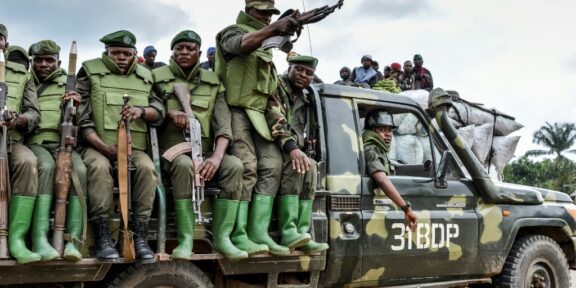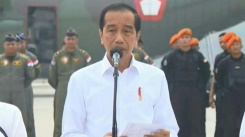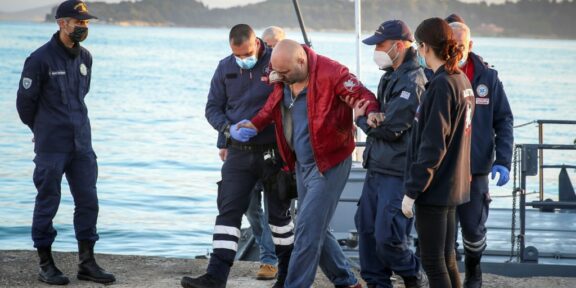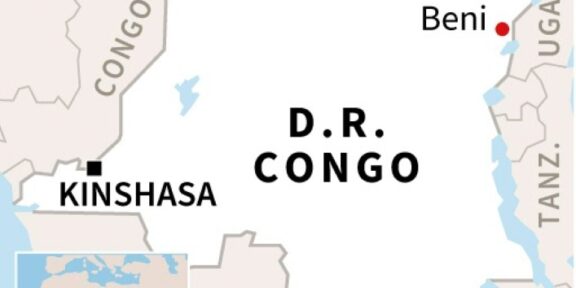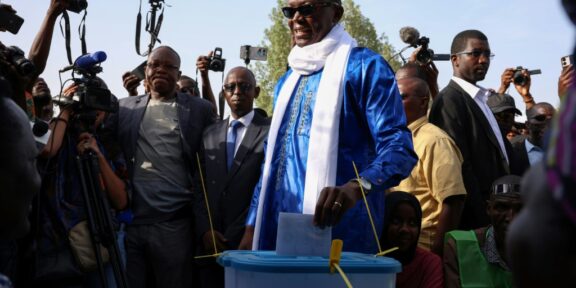Israel carried out more deadly strikes on Gaza Tuesday ahead of an expected UN Security Council vote on another ceasefire appeal, as concern mounted over the war’s impact on global shipping.
One of Israel’s enemies, Yemen’s Iran-backed Huthi rebels, have repeatedly attacked cargo ships in the Red Sea, leading major firms to divert their vessels and the United States to announce an international naval coalition to protect them.
US Defense Secretary Lloyd Austin — who on Monday pledged “ironclad” US support for Israel — joined an online conference on the coalition set to include warships from Britain, France, Italy, Spain and other countries.
A top Huthi official later Tuesday said any country that acts against the rebels “will have its ships targeted in the Red Sea”.
Israel maintained its bombardment and ground combat Tuesday in the third month of the bloodiest-ever Gaza war, which started with unprecedented attacks by Hamas against Israel on October 7.
The militants burst through the militarised Gaza border fence, killed around 1,140 people in Israel, mostly civilians, and abducted about 250, according to the latest Israeli figures.
Gaza’s Hamas-run health ministry says Israel’s withering military response has killed more than 19,667 people, mostly women and children.
The UN estimates 1.9 million of Gaza’s 2.4 million residents are displaced.
Homes have been destroyed, forcing many into overcrowded shelters as they struggle to find cooking fuel, food, water and medical care.
With power and communication cuts, Gazans are returning to time-worn traditions including battery-powered radio sets to get news of the war.
“Here in Gaza we’re moving backwards,” said Salah Zorob, 37, outside his tent. “They’re going to take us back to the Stone Age.”
Tor Wennesland, the UN’s special coordinator for the Middle East peace process, said delivery of humanitarian aid “continues to face insurmountable challenges”.
He said Israel has taken positive “limited steps” but they fall far short of what is needed.
Explosions were heard Tuesday night in the northern Gaza area, over a live AFPTV feed.
Strikes on Rafah overnight Monday-Tuesday killed at least 20 more people, the Hamas health ministry said, bringing more suffering to the southern town that has become a vast camp for displaced Palestinians.
In Tel Aviv, air raid sirens wailed as rockets fired from Gaza sent Israelis running into shelters before the incoming fire was intercepted by an air defence system.
– Rage –
Israel’s military said its troops found explosives planted in a medical clinic in a Gaza City suburb, destroyed Hamas tunnels and killed Hamas operatives during recent operations.
The army says 132 troops have been killed in Gaza since its ground invasion began in late October.
Hundreds of Palestinians have been detained in the military operations across Gaza, and on Tuesday the army said it is investigating “the deaths of terrorists in military detention centres”. It gave no details.
US officials including Austin have urged Israel to protect civilians in Gaza. On Monday he vowed to also keep arming Israel, which receives billions of dollars in American military aid.
International alarm has spiralled over the suffering brought by the war for traumatised Palestinian families.
British Foreign Secretary David Cameron on Tuesday urged Israel to take a “much more surgical, clinical and targeted approach” in dealing with Hamas.
James Elder, spokesperson for the United Nations children’s fund, UNICEF, expressed his rage after returning from Gaza.
He said he was “furious that those with power shrug at the humanitarian nightmares unleashed on a million children”, including some who had undergone amputations and were then “killed in these hospitals”, as bombardments continue.
One of the last remaining hospitals in northern Gaza, Al-Ahli, stopped operating after it was stormed and “put out of action” by Israeli forces, its director Fadel Naim told AFP.
The UN Security Council was set to convene later Tuesday, after a one-day delay, to weigh another call for a ceasefire. The United States vetoed a previous bid.
A draft of the resolution introduced by the United Arab Emirates called for an “urgent and sustainable cessation of hostilities” to allow “safe and unhindered humanitarian access”.
But according to diplomatic sources, a new, modified text calling for the “suspension of hostilities” is now on the table, in a bid to secure a compromise.
– Fears of escalation –
A top concern for many Israelis remains the fate of the 129 hostages still held in Gaza after 80 were freed last month in exchange for 240 Palestinian prisoners.
Hamas released footage it claimed showed three of those still held captive — elderly and bearded men who asked to be released.
Israeli military spokesman Daniel Hagari called it “a criminal terror video that is evidence of Hamas’s brutality toward innocent elderly civilians who need medical attention”.
The Gaza war has sparked fears of regional escalation and seen Israel trade deadly cross-border fire with Iran-backed Hezbollah militants in southern Lebanon.
Israel’s military said its air force “attacked a squad of terrorists” and a tank fired at a Hezbollah target while air defences took out “a suspicious aerial target” that flew in from Lebanon.
Huthi rebel attacks have also intensified on the Red Sea maritime zone crucial for an estimated 40 percent of Europe-Asia trade.
Four of the world’s biggest shipping companies — CMA CGM Group, Hapag-Lloyd, Maersk and MSC — have diverted their vessels, as has oil firm BP, in a move that sent up energy prices.
Voyages rerouted around Africa’s Cape of Good Hope can take around 10 days longer, piling on fuel costs and threatening delays and supply shortages that can drive up consumer prices.
The US Navy already heads a maritime task force, created in April, focussed on “maritime security and capacity building efforts in the Red Sea, Bab al-Mandab and Gulf of Aden”, according to the website of the group known as CTF 153.
Yeswecantv.









